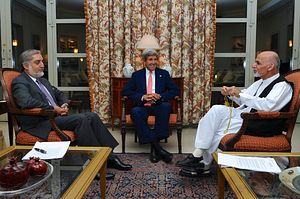Thursday, Afghanistan’s Chief Executive Officer Abdullah Abdullah laid into President Ashraf Ghani. Abdullah said he had not met with Ghani in three months. “Over a period of three months you don’t have time to see your chief executive one-on-one for even an hour or two?’’ he said. “What does your highness spend your time on?’’
Abdullah called Ghani out for failing to address issues of national concern, particularly long-awaited and much-needed electoral reforms.
“The election reform is a must, there is no alternative for it… why is the process not moving forward, we do not discuss it,” Abdullah said.
The NUG, a temporary political solution brokered by U.S. Secretary of State John Kerry which settled the tumultuous 2014 presidential election, was predicated on convening a Loya Jirga within two years to amend the constitution and create the post of prime minister. The NUG installed Ghani as president and Abdullah as CEO after a tense runoff for the presidency. Ghani came out on top, but Abdullah and his supporters said he’d rigged the vote (Abdullah also said he’d been robbed in 2009, by Hamid Karzai).
The two-year deadline is September 2016. But as Martine van Bijlert and Ali Yawar Adili pointed out in a late May 2016 article, “it is clear that these timelines will not be met.” The holding of a Loya Jirga with the authority to amend the constitution requires parliamentary and district elections. But electoral reforms–in addition to rolling out national electronic identity cards–are at a virtual standstill, delaying the needed elections until after September at the earliest.
As the clock runs out, Abdullah has gone public with his frustrations.
“There are arguments in any government,’’ Abdullah said, “but if someone does not have the patience for discussion, then they are not fit for the presidency, either”
According to the New York Times, a Ghani spokesman initially declined to comment about Abdullah’s statements. The Presidential Palace has since come out with a statement, pushing back against Abdullah’s screed, expressing regrets at the comments and saying they are not in line with the spirit of governance.
Abdullah supporters, meanwhile, are coming out in support of the CEO’s remarks.
“Dr. Abdullah was forced to say what he said today because President Ghani is not consulting him on anything,” Mirwais Yasini, a member of Parliament, told the New York Times.
“I support the Chief Executive Officer’s stance today in which he clearly spoke regarding the demands and wishes of the people,” said Atta Mohammad Noor. Noor, a powerful and prominent political figure, was appointed governor of Balkh province in 2004 by Karzai. In 2015, Ghani dismissed him, but as the New York Times detailed last April, Noor declined to vacate office and there hasn’t been much the central government can do about it. In June, protesters in Balkh demanded his removal, but Noor is staying put.
To add further depth: Noor has a long-running rivalry with current first vice president, Abdul Rashid Dostum. Noor has supported Abdullah and Dostum has stood behind Ghani. The deep roots of political conflict in Afghanistan stretch back to the 1990s (and before), with the then-young leaders and members of the mujahideen now elder statesmen, still encumbered by the past.
While political conflict gridlocks the central government, the Taliban and other militant groups continue their fight. Notably, while Abdullah takes aim at Ghani, the Afghan military is under considerable pressure in Helmand.

































